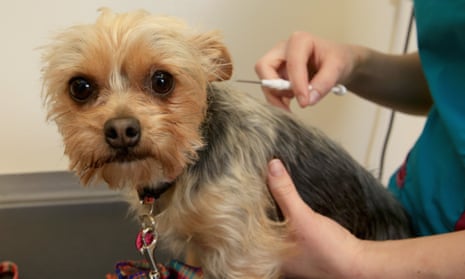Are vets routinely overcharging animal lovers, masking their fees and making it near impossible for owners to shop around? Research by Guardian Money has found that prices for basic procedures can vary by as much as 100% around the country. But more worrying is that consumers can’t compare prices, with half of the vets contacted by Money flatly refusing to disclose how much they charge.
Our research comes amid government rules that came into force this week requiring all dog owners in the UK to have their pets microchipped or face penalties of up to £500. Some councils and pet charities are offering this free, but when we surveyed vets the price varied from £10-£25.
We randomly selected 12 vet practices from across the different regions of England, Scotland, Wales and Northern Ireland. Only half were prepared to disclose their range of fees for procedures such as vaccinations, spaying and worming.
Two big chains – Vets4Pets (owned by Pets at Home) and the CVS Group, a network of 300 surgeries – declined to tell us their fees, and we could find little on their websites.
Vets we approached in Scotland and the south-west of England gave point-blank refusals, while one told us we could see its fees but that they could not be disclosed to the public.
But there were vets that were happy to give information on fees and charges, with the results in our table (see above). What emerges is that prices vary considerably across the country, with practices in Northern Ireland capable of performing identical services at half the price of those in the midlands of England. London, perhaps predictably, was most expensive. Puppy vaccinations ranged from £64 in the capital to £40 in Norfolk and £35 in Northern Ireland.

Vets’ fees are largely unregulated. The Royal College of Veterinary Surgeons says that disparities reflect location and whether the practice is basic or of hospital standard. Lizzy Lockett from the RCVS says: “We regulate individuals rather than the business. We do say that fees can’t be so high that it will constitute serious professional misconduct, which is a trigger for our disciplinary process. We also say that fees charged to clients who are insured should be no different to those who aren’t insured.”
The RCVS recommends that pet owners ring around veterinary practices to get an idea of costs, although our survey indicates that consumers are likely to find that a struggle.
A vet for more than 33 years, Joyce Whitehead from Galtres Veterinary Surgery in North Yorkshire, spells out the cost of running a practice. She says: “You see a lot of bad press saying that vets are really expensive, but the average salaries are not as good as the medical profession. People don’t realise that if you went to see a private medical consultant they would charge £200 for a consultation, yet we charge £28.”
Whitehead, who has co-owned her small rural practice with her husband for 21 years, adds: “People don’t understand the underlying costs. We have a lot of specialist equipment which needs maintaining. So it’s quite an expensive business. The other thing to think about is that we have to charge 20% VAT on top of our rates. Plus, we are under a legal obligation to provide a service 24 hours a day, 365 days a year, which we can’t opt out of.”
The costs of owning and caring for an average-size dog can mount up, even without vets’ bills. The PDSA Paw Report 2015 estimates that over the course of a lifetime it can be anywhere from £16,000 to £31,000 depending on the breed. Kay Colquhoun from the British Small Animal Veterinary Association says: “People need to understand that owning a dog is expensive, there’s no getting around it, even taking vets’ fees out of it.”
As Whitehead says: “One thing we tend to say to people is that owning a dog is a luxury and not a necessity. People need to think about the cost before buying one.”
An online poll among vets in 2014, asking How often does your practice receive complaints about the prices it charges?, found that 69% of their customers complained “all the time” or “fairly often”. But Pete Wedderburn, a vet and newspaper columnist, says the whole area of vets’ fees is riddled with myths.
“The reason why they are so costly is that costs are high. For every £10, around £7.50-£8 goes towards the running costs of the clinic, with the remaining £2-£2.50 going to the vet.
“Most vets are not business-savvy enough to construct a fee properly. So it’s often just what they think it should cost or what their neighbouring colleagues charge plus or minus a bit. The corporates are changing things, too, with low upfront fees, then hitting them for high fees behind the scenes on stuff that can’t be shopped around easily: did the surgery take five minutes or 50 minutes – who knows?”
A recent salary survey by the Society of Practising Veterinary Surgeons showed that the median salary of vets who have been qualified for a year is £34,000, while the median salary of a vet qualified between 10 and 20 years is between £47,400 and £61,700. The hourly rate for vets ranges from £14.66 for new graduates to around £35 for vets with 20 years experience.
There are 9.3 million dogs in the UK, a million of which are not yet microchipped, and half are not covered by insurance policies.
According to insurer More Th>n, which has rather an interest in pushing pet owners to buy its policies, the most common treatment for dogs is for joints, with an average claim at £452.92. This was followed by growths or tumours at £433.57 and skin conditions at £204.57. The top three most expensive claims that hit owners were fractures, costing an average £809.94 a claim, hernias at £619.75 and tumours at £433.57.
As Whitehead explains: “Orthopaedic surgery is very expensive because you’re dealing with good quality premises and keeping their staff up-to-date in education. They are as highly qualified as a hospital consultant is.
“If you have a dog with a complex fracture, you’re easily talking £4,000-£6,000 in surgery, and that’s why insurance is important. I insure my own dog for that very reason. If one of my dogs breaks his leg I don’t want to face a bill of £4,000.”
So is pet insurance the answer to animal lovers’ financial woes? Unfortunately, they can be sorely disappointed when it comes to making a claim.
Whitehead says: “I’ve seen policies that are really cheap. They will say they will cover £4,000 of vet fees, but in the small print it’s [a maximum of] £500 per condition. Which is actually not that much use, because if you’ve got a dog with a broken leg and you only get £500 towards the cost, you’ve still got to pay £3,500. So it’s pointless.”
Average policies can start from as little as £21 a month says Moneysupermarket, but can go up to £100 depending on what exactly you want your dog to be covered for.
Colquhoun points out: “If you think your dog is going to roam a lot, and potentially cause a car accident, the cheapest pet insurance won’t offer cover for that.”
Whitehead says she always recommends that pet owners take out lifetime cover for their animals. “Sometimes people get a puppy that comes with free insurance for the first couple of months, which the new owner may continue for the first year but then decide to shop around after that.
“What they don’t realise is, if that dog has been treated even for something minor, the new insurance company will exclude pre-existing conditions.”
Three top tips when buying pet insurance
Buy lifetime cover insurance “We always recommend lifetime cover,” says Joyce Whitehead from Galtres Veterinary Surgery. It is designed to pay for any chronic or recurring condition during the pet’s entire lifetime, compared to other policies which might refuse cover once they reach a certain age, or because of pre-existing medical conditions. Trouble is, it is expensive: for a labrador it can cost four times as much as basic accident-only cover.
Read the small print “More often than not insurance companies don’t pay out, because people haven’t read the small print of the policy,” says Whitehead. Don’t just look for the best price, but for the best cover, and individual payout restrictions.
Don’t pay for unnecessary cover “If you’re never going to take your dog abroad, you won’t need European cover. If you don’t live on your own you won’t need emergency boarding cover. These are all things that will add a few pounds on to your policy,” says Rose Howarth, Moneysupermarket’s head of pet insurance.
Case study: ‘You must anticipate the costs’
Marie-Claire Pickard, 35, is the owner of two dogs and recently received a vet’s bill for £550 for her two-year-old Lurcher, who unexpectedly had to have a toe removed, writes Juliet Stott. She is expecting her pet insurance will cover it. Pickard, who has been running her own dog walking business Paws...Go! near York for two years, says she only took out insurance after hearing about a “horrendous” vets bill her in-laws received (which was covered by their insurer).

She admits that owning dogs is costly. She paid £725 for her puppies, and pays £740 a year for insurance and her local vet’s healthcare plan, which includes the annual booster vaccination, flea and worm pills and 10% off other treatments.
“I know people will think I’m mad for spending that amount of money, but we don’t have children and our dogs bring us a lot of pleasure and joy. Compared to when we had a dog 20 years ago, my parents don’t remember spending this much money. It just seems that there are more options now due to new technology. If a dog needs an x-ray, usually the practice has that equipment – so instead of it being a big decision as it once may have been, you think let’s just do it. If you’re looking to get a dog you’ve got to anticipate the costs associated with properly caring for it. I think it’s unreasonable to take a dog on without anticipating the financial cost.”
(Veterinary practices consulted for figures in this piece were: Brockwell Vets, Herne Hill, London; Companion Care Vets, Leicester; Campsie Vets, Omagh, Northern Ireland; Carmarthen Veterinary Centre and Hospital, Wales; Galtres Veterinary Surgery, Leicester; and Mill House Veterinary Surgery and Hospital, Kings Lynn, Norfolk.)

Comments (…)
Sign in or create your Guardian account to join the discussion